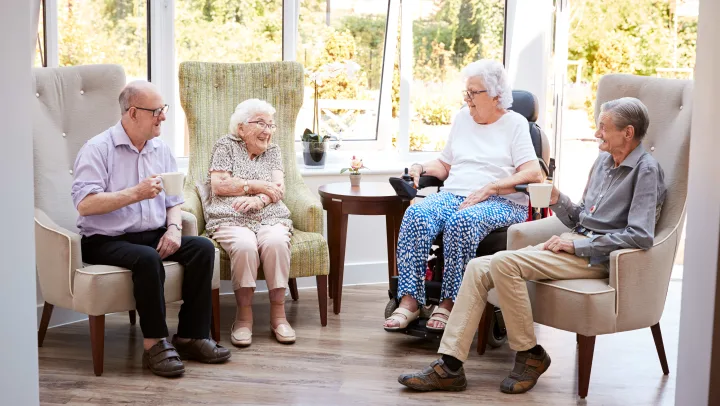Discover luxury Assisted Living residences with exceptional amenities.
Discover luxury Assisted Living residences with exceptional amenities.
Blog Article
How Assisted Living Facilities Enhance Quality of Life for Those With Dementia
Aided living centers play a pivotal role in improving the lifestyle for people with dementia by implementing tailored care methods that cater to their distinct needs. These settings incorporate structured tasks with emotional assistance, fostering a sense of area while making certain safety and self-reliance. The integration of appealing programs and family members participation even more enriches the residents' experience. Yet, the intricacies of mental deterioration treatment remain to advance, motivating a better exam of just how these facilities adjust and introduce to meet the difficulties dealt with by locals and their families. What effects does this have for future care designs?
Personalized Treatment Plans
(Dementia Care Charlotte)In a lot of cases, individuals with mental deterioration require tailored assistance that resolves their special needs and preferences. Individualized care strategies are crucial in assisted living settings, as they guarantee that each resident gets ideal focus and services. These plans are established collaboratively, including health care experts, caretakers, and member of the family to create a comprehensive introduction of the individual's case history, cognitive abilities, and individual rate of interests.
A well-structured customized care plan typically includes certain goals connected to health and wellness management, everyday tasks, and social engagement. It accounts for the person's cognitive decline while promoting freedom and self-respect. Regular evaluations and updates to the care strategy are crucial, as they permit adjustments based on the resident's developing condition and choices.
Key components of these strategies commonly involve medication administration, behavioral support methods, and dietary standards tailored to the individual's demands (Assisted Living). By focusing on personalized care, assisted living facilities can promote a supportive setting that improves the lifestyle for individuals with dementia, eventually adding to their general health and happiness. This individualized technique respects the originality of each homeowner, ensuring they obtain the thoughtful treatment they require

Engaging Activities and Programs
Involving citizens in significant tasks and programs is essential for enhancing the lifestyle for individuals with dementia. These activities not just provide pleasure but also boost cognitive feature and promote social communication, which can mitigate sensations of isolation usually experienced by residents.

Additionally, personalized programs are vital in making sure that each homeowner's one-of-a-kind choices and capacities are recognized. This tailored technique urges engagement, improves self-confidence, and provides a feeling of accomplishment.
Furthermore, normal assessments of residents' interests can aid staff customize and adapt activities to far better match progressing needs. By focusing on interesting tasks and programs, helped living facilities can dramatically improve the overall experience and psychological wellness of individuals coping with mental deterioration.
Safe and Helpful Atmosphere
Developing a risk-free and encouraging environment is important for individuals with mental deterioration, as it straight impacts their health and lifestyle. Aided living centers are developed with specific attributes that advertise security while promoting a sense of protection and convenience. These environments prioritize access, with designs that minimize complication and motivate self-reliance, enabling residents to browse their surroundings extra easily.
Precaution, such as safe entrances and leaves, avoid straying and unauthorized access, which are critical factors to consider for people with mental deterioration (Assisted Living). Team member are trained to identify the one-of-a-kind requirements of residents, supplying tailored support and guidance to guarantee their safety. The consolidation of relaxing colors and familiar objects can assist minimize anxiousness and disorientation, creating a much more comforting environment.
In enhancement to physical safety, emotional assistance is paramount. Facilities often employ personnel that are not just competent in caregiving yet also trained in compassion and interaction, promoting depend on and rapport with locals. This alternative method adds to a caring atmosphere where people really feel valued and recognized, inevitably enhancing their total high quality of life.
Social Communication and Community
A supportive atmosphere not only prioritizes security however likewise promotes opportunities for social interaction and neighborhood involvement, which are important for individuals with dementia. In nursing home, structured activities and communal spaces motivate residents to get in touch with one another, decreasing sensations of seclusion commonly experienced by those with cognitive impairments.
Social interaction plays a considerable role in boosting psychological well-being and cognitive feature (Assisted Living). Involving with peers in team tasks such as games, arts and crafts, or exercise not only stimulates cognitive capabilities yet likewise supports a sense of belonging. Facilities commonly organize occasions that advertise socialization, permitting citizens to construct connections and share experiences, which can be especially valuable for those with mental deterioration
Additionally, a why not try these out vivid community environment can boost the total top quality of life for homeowners. Personnel members are trained to help with communications and support locals in developing purposeful connections.
Family Members Involvement and Support
Household involvement is critical in supporting people with mental deterioration in assisted living environments. Proactively engaging household participants not only gives psychological comfort to locals but additionally cultivates a feeling of belonging and continuity in their lives. When households get involved in treatment planning and day-to-day activities, they contribute beneficial understandings concerning the person's choices, history, and requires, which can enhance individualized care.
Furthermore, regular family members brows through can significantly boost the psychological wellness of citizens, minimizing sensations of seclusion and stress and anxiety. Member of the family can likewise help in keeping cognitive function by involving their enjoyed ones in acquainted conversations and tasks. This communication enhances personal identification and aids residents feel valued and understood.

Verdict
In final thought, helped living facilities substantially enhance the top quality of life for individuals with dementia via individualized treatment plans, involving activities, and a risk-free setting. Jointly, these variables produce a holistic method to care that addresses the one-of-a-kind needs of individuals with dementia, promoting total well-being and self-respect.
Report this page